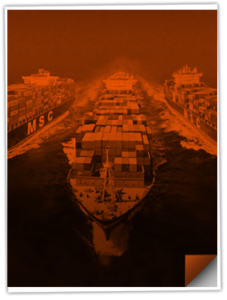Featured Headlines:
Canadian Rail Strike Coming...Again
Containing China's Container Explosion
USDA Says NOP-e to the Organics Trade Community
US Department of State Strums the ITAR Strings
Singapore’s Not-So-Free Trade Zone
Venture Capital Investments in Logistics Tech Cool Down
Wage Wars and Other Dockworker Drama
The US Trade Deficit: Harrowing or Narrowing?
Canadian Rail Strike Coming...Again
- The Canadian Industrial Relations Board (CIRB) has determined that commodities transported by rail are not classified as essential services, which opens the door for a potential labor strike on August 22.
- Although the CIRB’s ruling could lead to economic headaches, officials don’t find its determination to be earth-shattering for the industry—unless you consider long-haul trucking the ultimate inconvenience. (Dun, dun, dun…!)
- Representing thousands of rail workers, the Teamsters Canada Rail Conference (TCRC) has been at odds with Canadian National (CN) and Canadian Pacific Kansas City (CPKC) over issues like salaries, work-life balance, and rest periods.
- In this most recent development, railroad officials want to introduce a new hourly wage system, which the union says is code for “pay cuts.”
- If the strike moves forward on August 22, the Canadian ports of Vancouver and Prince Rupert are poised to take a big hit, as most of the cargo routed through the area relies on rail. Which means shippers might just have to start playing “TRUCK VS. TRAIN” to keep their goods moving…
- With the Canadian parliament on break until September 16, the potential strike could force lawmakers back to Ottawa to pass back-to-work legislation. (How sad!)
- The CIRB noted that alternatives like trucking and pipelines could temporarily replace rail for non-containerized commodities. So, while a potential strike might sound messy, it’s not quite the end of the line just yet.
Containing China's Container Explosion
- Yang Ming announced that a container holding reactive organic peroxides exploded onboard the vessel YM Mobility at the Port of Ningbo on August 9, 2024 at approximately 1:45 PM local time.
- The explosion occurred while the ship was berthed at the Ningbo Phase 3 Terminal. Although it sent thick black smoke and debris into the air, no casualties or injuries have been reported as of this time.
- According to Yang Ming, the container was a refrigerated unit, used as a dry container substitute without requiring a power connection. It contained chemicals rated as hazard class 5.2—meaning they were highly combustible and prone to explosive decomposition under certain conditions.
- The incident follows a recent reminder issued by Yang Ming about its $30,000 misdeclaration fee for dangerous goods and stresses the critical role that providing accurate cargo information can play to avoid hazardous conditions, such as this.
- Officials at the Port of Ningbo are currently investigating the situation in order to determine the exact cause of the explosion and to prevent similar incidents from occurring in the future.
USDA Says NOP-e to the Organics Trade Community
- Beginning September 19, 2024, the U.S. Department of Agriculture’s (USDA) National Organic Program (NOP) will no longer allow the use of the temporary filing code (999-999-T) in the Automated Commercial Environment (ACE) for organic entries without an NOP Import Certificate (NOP-IC).
- According to the announcement, an NOP-IC must be obtained prior to export. If a valid NOP-IC cannot be secured at the time of filing, then the shipment must be changed to non-organic or be re-exported.
- Any shipments filed using the temporary code after the effective date will be subject to enforcement actions from US Customs and Border Protection (CBP).
- For more details, please refer to CSMS # 61723113.
- Worried that your supply chain might be affected by the latest announcement? Reach out to our Compliance Crew today.
US Department of State Strums the ITAR Strings
- On August 15, 2024, the US Department of State issued a final rule in the Federal Register under the International Traffic in Arms Regulations (ITAR) regarding Amendments to the Definition of Activities That Are Not Exports, Reexports, Retransfers, or Temporary Imports.
- The final ruling includes six (6) changes made by the Department since the original development and introduction of the proposed rule (87 FR 77046) on December 16, 2022. These include the following:
- The first provision now notes there is no change in end-use or end-user, and the next provision is the requirement that the items be transported by and remain in the possession of the previously authorized armed forces or United Nations military personnel.
- Amends paragraph (a)(6)(i), by changing “subject defense article” to “defense article” to reduce unnecessary text.
- Amends paragraph (a)(6)(ii), by adding the phrase “previously authorized” before “armed forces” to reinforce that the armed forces or United Nations (U.N.) military personnel transporting and in possession of the defense articles must be previously authorized end-users of the defense articles.
- Amends paragraph (a)(6)(i), which will now become paragraph (a)(6)(ii), by revising the phrase “U.N. personnel” to “U.N. military personnel.” The Department added the additional word to ensure that non-military persons associated with U.N. missions, such as civilians, including police, working for various U.N. agencies are not mistakenly believed to be described by the provision.
- For the fifth and sixth changes, the Department narrowed the scope of the proposed excluded list of activities that are not exports, reexports, retransfers, or temporary imports, by not excluding temporary imports into the United States, or subsequent exports in response to comments.
- Additional information, including instructions on submitting public comments, can be found in the official Federal Register Notice (2024-18249).
Singapore’s Not-So-Free Trade Zone
- Effective September 1, 2024, transport service stakeholders at the Port of Singapore will encounter the not-so-new challenge of pre-filing cargo information prior to a vessel’s arrival.
- According to the announcement, long-haul importers are required to submit data 12 hours before arrival. However, short-haul shippers still have until the ship departs to provide these details. In essence, it’s like trying to guess what’s for dinner before you’ve even left for the grocery store…aka not for the weary!
- For export cargo, the paperwork must be filed within 24 hours after the vessel leaves the port.
- What happens when you forget to file…? Great question! You could be hit with lofty fines or worse—because nothing says “fun” like scrambling to avoid a $10,000 (SGD) fine or a potential 12-month vacation in a less-than-luxurious Singapore prison…right?
- The best part is that authorities aren’t playing around! They’ve assured the trade community that they will review any late, missing, or inaccurate submissions on a case-by-case basis, which sounds like they’ll be as understanding as a drill sergeant with a broken watch.
- Industry observers are already predicting this new regulation could be a pain, thanks to the complexities of global supply chains!
Venture Capital Investments in Logistics Tech Cool Down
- In 2023, venture capital (VC) investment in logistics technology plummeted to $2.9 billion, down nearly 90% from its $25.6 billion peak in 2021.
- The pandemic-era frenzy is clearly over, and VCs have realized that disrupting logistics isn’t as easy as it once looked during the tech boom.
- Early investments in this technology sector underestimated the staying power of industry incumbents and the inherently long sales cycles. It turns out you can’t just fax your way to a quick disruption!
- Despite $140 billion worth of global investments between 2012 to 2023, the industry’s core structure remains largely unchanged over the past decade.
- Although the technology has improved user experiences and automated processes, it still hasn’t managed to shake the foundations of the market.
- VCs are now focusing on startups that focus on enabling instead of disrupting. The hotshots are betting big on technology that enhances, not replaces, the operations of 3PLs and supply chain.
- It’s basically a shift from a “let’s take over the world” mindset to a humbler “let’s help out” approach…impressive, right?
Wage Wars and Other Dockworker Drama
- Maritime employers are ready to throw some serious cash on the table, offering “industry-leading wage increases” to longshore workers along the US East and Gulf coasts.
- Essentially, this would mean more money in the pocket, higher starting wages for the newbies, and beefed-up retirement contributions.
- Not surprisingly, the International Longshoremen’s Association (ILA) isn’t buying what the employers are selling. They’re looking for a nearly 80% wage bump, not just a little extra spending money.
- They’ve made it clear that if they don’t get what they want, they will not be sticking around after the upcoming contract expiration.
- On top of the wage war, the ILA is ticked off about Maersk’s APM Terminals sneaking in some shiny new automated gate tech at the Port of Mobile in Alabama.
- As the clock ticks down to September 30, ILA President Harold Daggett has made it clear: no deal, no work.
- If the big bosses aren’t careful, this could end up being the first time that dockworkers along the East and Gulf coasts hang up their hard hats and take to the picket lines since the late ’70s.
The US Trade Deficit: Harrowing or Narrowing?
- In June, the US trade deficit narrowed by 2.5%, marking the first time in three months that the gap has decreased. The deficit now stands at $73.1 billion, just slightly above economists’ expectations of $72.5 billion.
- The value of exports rose by 1.5%—the biggest increase since earlier this year—driven by outbound shipments of commercial aircraft, natural gas, petroleum products, and motor vehicles.
- Meanwhile, imports grew by a more modest 0.6%, led by pharmaceuticals and capital goods.
- Despite the June improvements, the trade deficit in goods and services significantly impacted the gross domestic product (GDP) in the second quarter, subtracting the most from GDP since early 2022.
- Looking ahead, data from the Institute for Supply Management suggests a mixed outlook for July, with service exports showing solid growth, while manufacturing exports contracted for a second month.



